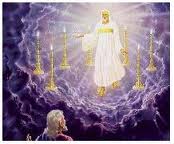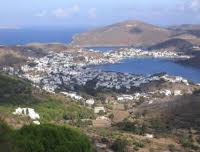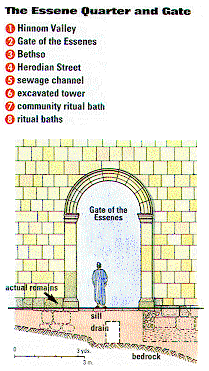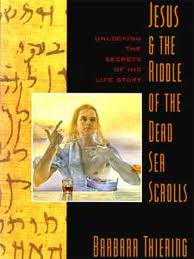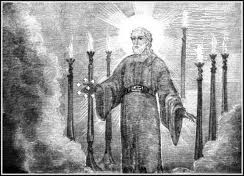|
PAGE ONE |
|
THE AUTHORS |
|
|
Some parts excerpted from "Jesus and the Riddle of the Dead Sea Scrolls" by Dr. Barbara Thiering, PhD, but mostly -- as interpreted by Dr. Robert F. Holt, MD
|
|
The authorship of the "Apocalypse", the book of Revelation, has been a subject of debate for the better part of 2000 years. What makes me think I can come along now and provide a definitive answer when so many others have failed to do so? The ANSWER: Now that we have "Gospel Pesher" we can determine by properly reading the book of "Acts" with proper attention to what was going on in the Gentile world of the first century AD and how these events were effecting Jesus' associates of the mid-century of that era, we can know who would be on the Isle of Patmos, when they would be there, and why. And also know that Jesus himself, after his crucifixion, was in the habit of coming out from seclusion into the "world" periodically from time to time when the church was in some sort of a crisis, to participate in whatever plans his associates were making to solve the problems they were now facing.
The Isle of Patmos Some of the various theories that have been proposed deny that Revelation was really written on the Isle of Patmos. "The ALOGI (Epiphanius Haeresea 51) and CAIUS the Roman Presbyter (EUSEBIUS 3. 28), towars the end of the second and beginning of the third century, ejected John's Apocalypse on mere captious grounds. CAIUS, according to JEROME, De Viris Illustribus, about 210, attributed it to Cerinthus, on the ground of its supporting the millennial reign on earth. DIONYSIUS of ALEXANDRIA mentions many before his time who rejected it because of its obscurity and because it seemed to support Cerinthus' dogma of an early and carnal kingdom; whence they attributed it to Cerinthus. This DIONYSIUS, scholar of ORIGEN, and bishop of Alexandria (AD 247), admits its inspiration (in EUSEBIUS, Ecclesiastical History 7. 10), but attributes it to some John distinct from John the Apostle, on the ground of its difference of style and character, as compared with John's Gospel and Epistle, as also because the name John is several times mentioned in the Apocalypse, which is always kept back in both the Gospel and Epistle; moreover, neither does the Epistle make any allusion to the Apocalypse, nor the Apocalypse to the Epistle; and the style is not pure Greek, but abounds in barbarisms and solecisms." Jamieson, Fausset & Brown, Commentary on the Whole Bible, Regency-Zondervan, 1961 -- page 1522. (Obviously if the book was written by someone other than the John who was confined on the Isle of Patmos, such as say --Cerinthus, or some other "John", then we need pay no heed to the idea that it was written on Patmos.) "One particular modern proposal is that John the Baptist wrote it, or at least part of it, and John the Baptist is never known to have traveled far from the Wilderness of Judea. But since this page is about possible authors of this very controversial book, let's look at this one also,, since WIKIPEDIA gives this theory at least some credibility. WIKIPEDIA Traditional view"The traditional view holds that John the Apostle ---considered to have written the Gospel and the Epistles of John—was exiled on Patmos in the Aegean archipelago during the reign of Domitian, and there wrote Revelation. Those in favor of apostolic authorship point to the testimony of the early church fathers and similarities between the Gospel of John and Revelation. For example, both works are soteriological and possess a high Christology, stressing Jesus' divine side as opposed to the human side stressed by the Synoptic Gospels. In the Gospel of John and in Revelation, Jesus is referred to as "the Word of God" , although the context in Revelation is very different from John. The Word in Rev 19:13 is involved in judgment but in John 1:1, the image is used to speak of a role in creation and redemption." "Charles Erdman (1866–1960) advocated apostolic authorship and wrote that only the Apostle John fits the image of the author derived from the text." Modern views"More recent methods of scholarship, such as textual criticism, have been influential in suggesting that John the Apostle, John the Evangelist, and John of Patmos were three separate individuals. Differences in style, theological content, and familiarity with Greek between the Gospel of John, the epistles of John, and the Revelation are seen by some scholars as indicating three separate authors." "The English Biblical scholar, Robert Henry Charles (1855–1931), reasoned on internal textual grounds that the book was edited by someone who spoke no Hebrew and who wished to promote a different theology to John's. As a result, everything after 20:3, he claims, has been left in a haphazard state with no attempt to structure it logically. Furthermore, he says, the story of the defeat of the ten kingdoms has been deleted and replaced by 19:9-10. John's theology of chastity has been replaced by the editor's theology of outright celibacy, which makes little sense when John's true church is symbolized as a bride of the Lamb. Most importantly, the editor has completely rewritten John's theology of the Millennium which is "emptied of all significance". "John Robinson in "Redating the New Testament" (1976) has heavily criticized Charles' position and accepted apostolic authorship, dating John's Gospel before the Siege of Jerusalem 70 AD. He also argues that John's "poor" Greek is a literary device since Galileans were known to have excellent Greek. He says: "The Greek of the Apocalypse is not that of a beginner whose grammar and vocabulary might improve and mature into those of the evangelist. It is the pidgin Greek of someone who appears to know exactly what he is about [to say]" "It has also been contended that the core verses of the book, in general chapters 4 through 22, are surviving records of the prophecies of John the Baptist. In this view, the Lamb of God references and other hallmarks of Revelation are linked to what is known of John the Baptist, though it must be confessed that little information about him is known.
Dating"According to early tradition, this book was composed near the end of Domitian's reign, around the year 95 AD. Others contend for an earlier date, 68 or 69 AD, in the reign of Nero or shortly thereafter. The majority of modern scholars accept one of these two dates, with most accepting the Domitianic one. "Those who favor the later date appeal to the earliest external testimony, that of the Christian father Irenaeus (c. 150-202), who wrote that he received his information from people who knew John personally. Domitian, according to Eusebius of Caesarea (c. 263–339), started the persecution referred to in the book. While some recent scholars have questioned the existence of a large-scale Domitian persecution, others believe that Domitian's insistence on being treated as a god may have been a source of friction between the Church and Rome." "The earlier date, first proposed in modern times by John Robinson in a closely argued chapter of "Redating the New Testament" (1976), relies on the book's internal evidence, given that no external testimony exists earlier than that of Irenaeus, noted above, and the earliest extant manuscript evidence of Revelation is likewise dated no earlier than the late 2nd century. This early dating is centered on the preterist interpretation of chapter 17, where the seven heads of the "beast" are regarded as the succession of Roman emperors up to the time of the fall of Jerusalem in 70 AD." "John W. Marshall dates the book to 69 or early 70 AD, saying it predates any formal separation of Christianity and Judaism, and that it is a thoroughly Jewish text." "Some interpreters attempt to reconcile the two dates by placing the visions themselves at the earlier date (during the 60s) and the publication of Revelation under Domitian, who reigned in the 90s when Irenaeus says the book was written." Canonical history"Revelation was accepted into the canon at the Council of Carthage of 397 AD. Revelation's place in the canon was not guaranteed, however, with doubts raised as far back as the 2nd century about its character, symbolism, and apostolic authorship." "2nd century Christians in Syria rejected it because Montanism, a sect which was deemed to be heretical by the mainstream church, relied heavily on it. In the 4th century, Gregory of Nazianzus and other bishops argued against including Revelation because of the difficulties of interpreting it and the risk of abuse. In the 16th century, Martin Luther initially considered it to be "neither apostolic nor prophetic" and stated that "Christ is neither taught nor known in it", and placed it in his Antilegomena, i.e. his list of questionable documents, though he did retract this view in later life. In the same century, John Calvin believed the book to be canonical, yet it was the only New Testament book on which he did not write a commentary. It remains the only book of the New Testament that is not read within the Divine Liturgy of the Eastern Orthodox Church, though it is included in Catholic and Protestant liturgies. "According to Merrill Unger and Gary N. Larson, in spite of the objections that have been raised over the years, Revelation provides a logical conclusion, not just to the New Testament, but to the Bible as a whole, and there is a continuous tradition dating back to the 2nd century which supports the authenticity of the document, and which indicates that it was generally included within the, as yet unformalized, canon of the early church."
Having given all these other guesses and theories due consideration, let's proceed with the most likely story, the hidden history of the meeting of Jesus himself with the man known in the Gospels as "John of Zebedee", who is the one generally thought of as being "John the Apostle" by the long-standing tradition -- people not knowing much about Eutychus, alias "John Mark" -- who actually wrote (along with Philip) the "Gospel of John". It seems this meeting did occur on Patmos, in the Fall of 49 AD, which is 20 years earlier than the earliest date suggested by the later scholars. What these scholars have failed to note is that in the reign of Claudius, the Christians were expelled from Rome because of a disturbance caused by the Samaritans. Writes Thiering on page 265 in her Chronology for the year 49 AD.
And on page 149: "In the few years prior to AD 50, a group of party leaders were in Rome, making the first attempt to revise the doctrine in a Christian direction. They had gone there following the great council in Jerusalem in AD 46, which had seen the legal establishment of the Christians as a separate mission, allowing also their development in two directions, the east under Jewish Christians." "The Rome group included Peter and John of Zebedee, now using the name Aquila. With James of Zebedee and Andrew, these four had been appointed as the new "four pillars of the world". (Galations 2:9) Jesus and Luke, his physician, were also present, Luke using the word "we" in narrative to indicate the presence of both." "Paul, who worked separately from Jesus after the council of Jerusalem, remained in Asia Minor to continue the work of revision. He was to some extent out of fellowship with the Rome group, having gone well beyond them at the council in his advocacy of an abandonment of Jewish identity. Peter was still partly in sympathy with James, holding that the work of the mission was to bring Gentiles into an adapted form of Judaism." "A Roman historian records that in about AD 49 Jews were expelled from Rome for "rioting at the instigation of Chrestus". Christians with an outlook like that of John of Zebedee, as illustrated in his book of Revelation, were capable of fervent action in expectation of heavenly support. But Roman authority would not tolerate further trouble from the Jews. They were driven out, going back to Greece, which in their world scheme was the eastern limit of the province of Rome."
|
